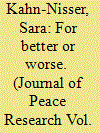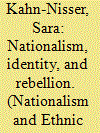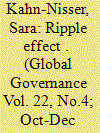|
|
|
Sort Order |
|
|
|
Items / Page
|
|
|
|
|
|
|
| Srl | Item |
| 1 |
ID:
187251


|
|
|
|
|
| Summary/Abstract |
This article looks at the linkages between export to the European Union (EU), export to china and human rights policies. The article argues that countries that export to the EU at high rates are more likely to converge towards its policies than countries that don’t export to the EU. The article also argues that the rise of China as a significant economic actor does not undermine this process. The article tests these arguments by analysing the links between human rights protection in the EU and in China, and export to the EU and to China, on the one hand, and human rights protection in all the countries for which there are data, on the other. The results indicate that countries’ human rights policies are positively associated with the EU’s human rights policies and this association is conditioned by countries’ levels of export to the EU. The results further indicate that export to China does not undermine this pattern. The article draws conceptual and policy implications.
|
|
|
|
|
|
|
|
|
|
|
|
|
|
|
|
| 2 |
ID:
178725


|
|
|
|
|
| Summary/Abstract |
Does it matter whether human rights (HR) shaming is accompanied by acknowledgments of reforms and progress? Do such acknowledgments weaken or strengthen the impact of shaming? Rulers decide whether to oppress or to comply with HR treaty obligations by considering what compliance entails and by weighing the internal and external costs and benefits of oppression. Research shows that HR shaming alters such considerations and is associated with changes in HR protection levels. Can the same be said of faming? This article examines three forms of HR reporting: faming, which focuses on positive developments; shaming, which focuses on problematic HR practices; and scrutiny, which combines shaming and faming. The article analyzes the association between shaming, faming, and scrutiny by UN treaty bodies, on the one hand, and oppression on the other. The potential associations are conceptualized as mitigation, backsliding, and specification. The analysis finds that shaming with no faming and faming with no shaming are each negatively associated with HR protection. Scrutiny, the combination of shaming and faming, is positively associated with subsequent HR protection levels, and the higher the level of scrutiny the higher the subsequent level of HR protection. The article argues that the reason for this association is that the combination of shaming and faming helps policymakers understand how to properly implement their treaty obligations and how to improve HR protection. The article draws policy and theoretical implications including the need for balanced and detailed HR reporting, and the importance of learning in HR advocacy.
|
|
|
|
|
|
|
|
|
|
|
|
|
|
|
|
| 3 |
ID:
101436


|
|
|
|
|
| Publication |
2010.
|
| Summary/Abstract |
This article puts forward an in-depth examination of the Wadi Salib events. The recently disclosed proceedings of the Wadi Salib Committee of National Inquiry are interpreted to show how the Oriental Jews (Mizrachim) explained their actions in Zionist terms centered on Jewish kinship. The Western Jews (Ashkenazim) in turn, rejected the Oriental Jews' sense of alliance and underlined the colonial element of Zionist identity. Identity threat theory is incorporated to explain how the two opposing views of Zionism may have been constructed and how these may have contributed to the outbreak of the Wadi Salib events. Some conclusions regarding the nature of Israeli national identity, Ashkenazim-Mizrachim relations, and Majority-Minority, Immigrants-Veterans relations emerge.
|
|
|
|
|
|
|
|
|
|
|
|
|
|
|
|
| 4 |
ID:
149066


|
|
|
| 5 |
ID:
108032


|
|
|
|
|
| Publication |
2011.
|
| Summary/Abstract |
This article proceeds from the claim that the separation between normative political theory, political science, and politics is artificial, and that it should be challenged. In the first section, insights offered by Hans-Georg Gadamer and Charles Taylor, as well as more recent hermeneutic studies, will be brought in to show what we have to gain by incorporating normative theory and normative commitments into interpretive research programs. In the second section, I will interpret the normative commitments, with regard to inclusion, contained in the national-cosmopolitan debate, and the normative commitments, with regard to diversity, contained in the communitarian-multicultural debate. This section will close with the phrasing of "thematic questions," which occupy each of the debates, and of the typical answers each approach gives to these questions. This thematic-questions-and-typical-answers framework can be used as an interpretive instrument in the study of existing communities. The last section will exemplify how such an interpretation may be conducted. I will put forth an interpretation of the European Parliament's debate on the opening of accession negotiations with Turkey. I will show how asking the text the thematic questions, looking for answers within it, and identifying their normative orientation can produce insights on the community.
|
|
|
|
|
|
|
|
|
|
|
|
|
|
|
|
|
|
|
|
|